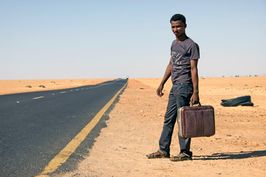Sudan
| Information | |
| Language: | Arabic, English |
| Capital: | Khartoum |
| Population: | 39,379,358 |
| Currency: | Sudanese pound (SDG) |
| Hitchability: | <rating country='sd' /> |
| Meet fellow hitchhikers on Trustroots | |
| <map lat='12.90001834116316' lng='29.50390625' zoom='5' view='0' float='right' height='450' /> | |
| Check out hitchhiking spots on Hitchmap | |
Sudan (Arabic: السودان, as-Sūdān), officially the Republic of the Sudan, is a country in Northern Africa. It was the largest state of Africa before South Sudan became independent in 2011.
It is bordered by Egypt to the north, the Red Sea to the northeast, Eritrea and Ethiopia to the east, South Sudan to the south, the Central African Republic to the southwest, Chad to the west and Libya to the northwest. The famous river Nile divides the country into eastern and western halves. The majority of the Sudanese people are Muslim.
Contents
Hitchhiking
Hitchhiking is very common in Sudan, especially outside Khartoum, where public transport tends to be scarce. Often a symbolic payment is typically expected, except for the region around Khartoum. You need a travel permit from the Ministry of Tourism (which will be issued for free) to travel outside the capital. You will be asked to show a copy of the permit at every police checkpoint you pass. Some sources claim that the permit is not required anymore for tourists travelling in the North, but this information did not arrive at the police at the checkpoints, so it's best to have a permit to show. Make copies of your travel permit to hand them to police, so that you don't need to give the original away.
Hitching is generally easy, although many of the citizens do not understand the concept of hitching, so it is best to say you are having money problems. On roads with trade and freight, you should easily be able to pick up a lorry. On minor roads, such as those heading north, often the only traffic will be with minibuses. These are modern, air conditioned and pretty reasonable.
Police checkpoints are very common in Sudan. Every town and city has a police check-point on the outskirts and they are especially around Khartoum and in the border regions. These checkpoints act as road blocks and can cause problems to the plucky hitcher. It was often the case that the police would just put you on a passing bus for no charge. The police are very helpful and warm, so long as all your permits are in order.
Experiences
TheLoneBaker: I hitchhiked through Sudan in 2018 and found it extremely easy. Most of the time the police didn't pay any attention and most of the rest of the time they just wanted to see my visa and didn't even bother to check the identification. Most nights I was invited to peoples homes to sleep on outside beds. I didn't encounter a single driver who expected payment even in the Khartoum area. Also, permits are no longer needed to travel in Sudan though you do still need to register with the police for a fee within 72 hours.
Border crossing
- The border to Chad is closed (July 13th, 2009).
- The border to Eritrea is closed (July 13th, 2009) except for Sudanese citizens.
- The border to Libya is closed (June 29th, 2010).
- The border to Egypt is open, but only on one single checkpoint (Wadi Halfa border crossing) or by boat via the Aswan Lake.
- The border to Ethiopia is open at the checkpoint near Gedaref
Danger
There are a lot of unsolved conflicts in Sudan, also there are landmines in almost every border region. Due to high crime rates and escalating conflicts hitchhiking in Sudan can be dangerous, especially in the western region of Darfur. Don't cross borders illegally because of landmines and the risk of being imprisoned for a long time.
Be careful when taking photos of official buildings you may be arrested as a spy. Getting arrested in Sudan is relatively commonplace, so don't be alarmed if it happens to you. They will take your details and release you shortly with matters such as photographs.
The rest of the country, especially the north, is much safer and the biggest danger here will be the extraordinary midday heat. Stay sheltered and well hydrated. Always carry plenty of water and snacks on you.
Almost everywhere in Sudan you will find terracotta water vessels in the cool shade of big trees, with a communal cup. These are great in emergency situations or, if your stomach is hardy, for general drinking water.
A lot of coffee stands or shops will have threadbare beds which you will be invited to rest on during the heat of the day.
Visa
It is possible to get a Sudanese visa in only one day at the Sudanese Embassy in Cairo, Egypt, for 100 US-$, or from Aswan, for 50 US Dollar. The visa will take one day in Cairo and between four days and a week in Aswan.
Update 2018: It seems the Sudan visa in Cairo is now 150 USD. Still available in one day though.
It is also possible to attain a Transit Visa in Kampala, Uganda from the Sudanese Embassy. It is valid for 2 weeks (in three months), is about 60 US-$, takes 3 days and is surprisingly straightforward to apply for.
When in Khartoum, is is possible to get a visa for Ethiopia in one day. However, they only issue 70 visas a day so you need to get in line by around 6 am. However, if you do get there a bit too late, you will be given a paper with a number and will be prioritized the next day.
Cities
- Khartoum (capital)
- Gedaref
- Wad Madani
Nomadwiki & Trashwiki
Check Trashwiki for dumpsters...and share your wisdom :)
